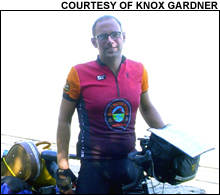 When Knox Gardner moved to Boston from Seattle last year, the biking enthusiast was miserable.
When Knox Gardner moved to Boston from Seattle last year, the biking enthusiast was miserable.
“I’d find myself coming home really angry, or yelling things at cars that I don’t normally,” the 35-year-old consultant, who has ridden across Europe and to Newfoundland, recalls. “The traffic is so hard that it’s often not really relaxing.” But eventually Gardner began to enjoy the “urban-exploring aspect of bicycling,” and he now keeps track of every Greater Boston road he’s been on by marking up a map with a highlighter. “It makes for some rather slow, hard biking, but I also get out to a lot of different places that I wouldn’t otherwise.” (Biking on Dot Ave, however, is “not for kids,” Gardner says.)

That adventurous spirit drew Gardner to the Boston nonprofit Hub on Wheels, an organization that runs neighborhood workshops, biweekly community rides, and large annual fundraising rides to increase both the city’s physical fitness and bike awareness. He now helps create self-guided bike tours around Greater Boston that are downloadable off the Hub on Wheels Web site, soon to be accompanied by an audio Podcast component.
So far, Gardner has completed two 23-mile rides (which he deems of “medium difficulty”): one through Boston’s Underground Railroad stops, the other exploring the city’s Jewish heritage (researching this ride took him to former synagogues in Mattapan, which now house raucous — and welcoming — Haitian churches). Next up: a Great Disasters of Boston tour, which will take bikers to the sites of the molasses flood of 1919 and the Cocoanut Grove nightclub fire of 1942, and possibly a “niche ride” that would explore an important chapter in Transcendentalist history at West Roxbury’s Brook Farm.
By summer, Gardner hopes to have prerecorded information available to bikers before they ride, which they could access on the road (at prearranged sites — not while biking) via cell phones or other portable audio devices.
Both Gardner and Hub on Wheels founder Steve Miller consider the self-led rides another step toward combating Boston’s bike-unfriendly reputation, the result of endless construction, ubiquitous potholes, crazy drivers, and narrow cowpath streets that often lack bike lanes.
“The whole point here, ultimately, is to make bicycle riding a normal part of living in Boston,” says Miller. “The more people who ride, the safer and easier it is to ride. Motorists learn to deal with it.”
On the hill
If tours and rides aim to snare new riders, or to expose practiced bikers to new neighborhoods, then the Massachusetts Bicycle Coalition’s (MassBike) advocacy efforts try to make everyday cycling more convenient.
Several of MassBike’s recent accomplishments will fall into place as the 2006 bike season kicks off. Starting this spring, the Massachusetts Bay Transportation Authority (MBTA) will outfit 300 buses with new bike racks, easing some cyclists’ commute. In January, the Massachusetts Highway Department started using a revised, bike-friendlier highway-design manual, which addresses engineering concerns such as road widths, bike lanes, pavement markings, and road signs for bikers. The state’s municipal-police training committee has voluntarily agreed to include bike law in its training curriculum. This means more tickets for bicyclists who don’t heed the rules of the road, but it will also clear up confusion when drivers and bikers collide.